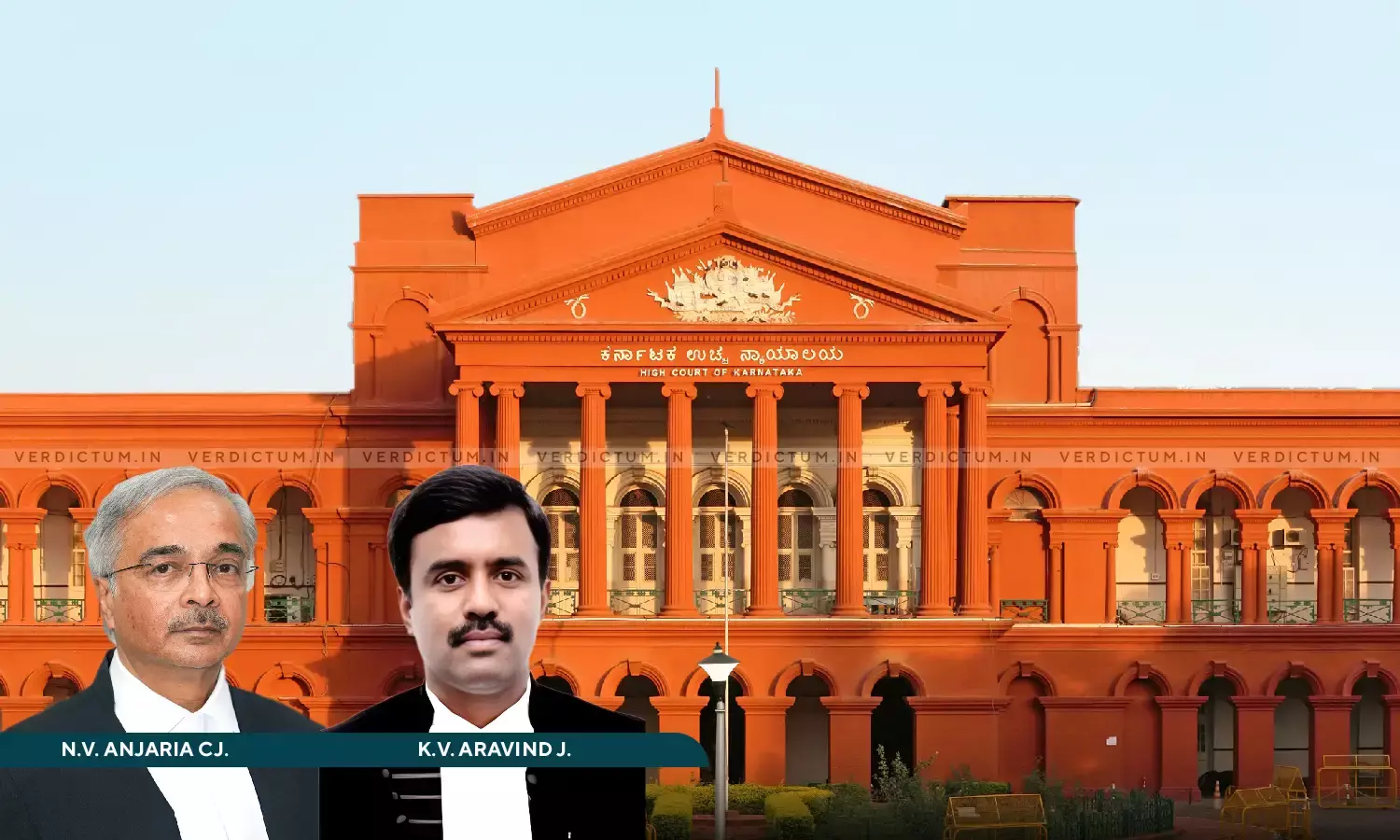IBC| Receiving Petition Initiating IRP Is Ministerial In Nature; It’s Elementary Stage Which Doesn’t Have Adjudicatory Process: Karnataka HC
The Karnataka High Court held that the act of receiving of the petition initiating the insolvency resolution process (IRP) is ministerial and procedural in nature and is an elementary stage which does not have any adjudicatory process.
The Court held thus in a writ appeal seeking setting aside of the order passed by the Single Judge in a writ petition.
A Division Bench comprising Chief Justice N.V. Anjaria and Justice K.V. Aravind observed, “Respondent No.1-the Registrar, National Company Law Tribunal in receiving the filed or lodged petition under Section 94 or Section 95, respectively by a debtor or creditor, as the case may be, to initiate the insolvency resolution process before the Registrar of the National Company Law Tribunal, performs pure administrative function. … The act of receiving of the petition initiating the insolvency resolution process is ministerial and procedural in nature. It is an elementary stage which does not have any adjudicatory process.”
The Bench said that the act on the part of the Registrar in receiving the petitions under Sections 94 or 95 of the Insolvency and Bankruptcy Code, 2016 (IBC) as the case may be, has no judicial trapping.
Senior Advocates S. Basavaraj, M.S. Sham Sundar, and Advocate Anish Acharya appeared for the appellant while Senior Advocate Om Prakash, CGSC M.N. Kumar, and Advocate S. Kiran Kumar appeared for the respondents.
Facts of the Case -
The Single Judge had allowed the writ petition and it was declared that e-filing of the petition by the appellant under Section 95 of IBC to be non-est and illegal, consequently setting aside all the connected proceedings. It was provided that any action taken upon registration of the proceedings shall stand obliterated. In the writ petition filed under Article 226 of the Constitution, the prayers made were to declare that the e-filing of petition by the appellant under Section 95 of IBC was void ab initio and illegal.
It was consequently prayed to restrict the NCLT (National Company Law Tribunal) from taking any action in furtherance of the said petition. The NCLT was further sought to be restrained from completing the scrutiny of the petition and returning the petition for rectifying the defects and also to restrict from numbering and registering the petition or placing the petition for hearing. The third limb of the prayer was to direct the NCLT to return and cancel the lodging of the petition.
The High Court in view of the facts and circumstances of the case, noted, “For the reason of operation of Section 96 under the statute, party filing application under Section 95 could not be saddled with allegation of not acting bona fide. A litigant has right to move the NCLT in accordance with the provisions of Insolvency Code and to be governed by the provisions of the Code cumulatively availing the remedy of filing application under Section 95 could be resorted to as of right by the applicant.”
The Court added that, if for the reason of filing Section 95 application, other proceedings initiated by the rival party in relation to the subject matter are slowed down or affected in their progress or stand postponed for some period, then it could not be complained that the invocation of law or remedy in law by other party amounts to abuse of process of law.
“A litigant is entitled to employ all legal means in pursuit to its right to legal adjudication and availment rights in that regard. This negates the submission on the part of the respondent-original petitioner that the filing of Section 95 application by the applicant had an effect of protracting and postponing the arbitral proceedings”, it further said.
Moreover, the Court enunciated that the stage of filing application under Section 94 or Section 95, is too preliminary a stage to perceive and conceive any adjudicatory attribute at that stage.
“… it is impossible to conclude that the Registrar at the stage of receipt of the petition filed under Section 94 or 95 of the Code by the debtor or creditor, which is a stage even prior to Section 97 and 99 of the Code can decide on the maintainability of the petition by entering into merit and thus the realm of adjudication”, it remarked.
The Court, therefore, concluded the following points –
• It is not permissible for the Registrar, NCLT, to go into the merits of the petition and/or to decide about maintainability thereof on merits, for, the Registrar does not discharge any adjudicatory or judicial function at this stage.
• Once the petition under Sections 94 or 95 of the Code, as the case may be, is filed and registered, it will follow the course contemplated in Sections 96 to 100. The operation of all these provisions is statutory.
• The resolution professional who would be appointed under Section 97, is required to submit report to the adjudicating authority recommending for approval or rejection of the application.
• It is the stage of Section 100 of IBC, which marks the commencement of adjudicatory process.
• The adjudicating authority within the stipulated time, upon submission of the report under Section 99, shall either admit or reject the application referred to in Sections 94 or 95, as the case may be.
• The adjudicatory function could not be pinned or performed at the stage of receipt of the petition by the Registrar, who has no legal sanction to assume the role of adjudicator to decide the maintainability of the petition.
Accordingly, the High Court allowed the appeal and set aside the impugned judgment.
Cause Title- Buoyant Technology Constellations Pvt. Ltd. v. M/s Manyata Reallty & Ors.




